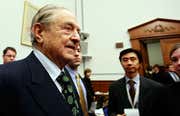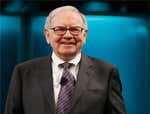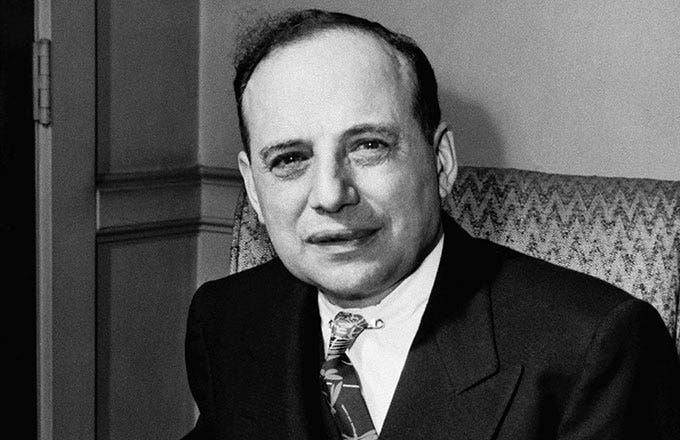Born: 1884 (London)
Died: 1976
Key Positions: Newburger, Henderson & Loeb
Graham-Newman Corporation
Personal History:
Benjamin Graham authored several books that have served as indispensable reading for rising investors in recent decades, “Security Analysis” (1934, written with David Dodd), and “The Intelligent Investor” (1949). Although born in London, Graham lived in the United States from his early childhood, growing up in New York City. Graham’s father died when he was only nine years old, leaving the Graham family in a difficult financial position and Benjamin with a focus on achieving financial security.
Graham studied at Columbia University, graduating in 1914, and began working at Newburger, Henderson & Loeb as a messenger immediately after graduation. Graham rose through the ranks exceptionally quickly and was named partner at the company by 1920.
Working together with partner Jerome Newman, Graham founded an investment partnership in 1926 and began to lecture at Columbia University on matters of finance. Graham would continue to lecture on these topics until his retirement in 1956. Although the Graham-Newman Corporation suffered greatly during the stock market crash of 1929, the partnership survived and eventually managed to recoup its losses. The experience was a formative one for Graham, who went on to co-author “Security Analysis” in 1934. From that time until its termination in 1956, the Graham-Newman Corporation thrived, sporting an average annual return of 17%.
Investment Philosophy:
Graham’s investment style may best be summed up by his second book, “The Intelligent Investor,” still considered to be one of the seminal texts on investing for the modern era. Graham’s fundamental philosophy was that any worthwhile investment would be worth substantially more than what the investor had to pay for it. Determining value of a potential investment requires thorough analysis (fundamental analysis, by modern parlance). Graham looked for companies with strong balance sheets, little debt, above-average profit margins, and significant cash flow. To describe his efforts to find undervalued companies with temporarily low stock prices and sound fundamentals, Graham coined the phrase "margin of safety.” The margin of safety refers to the difference between the purchase price of a stock and that company’s intrinsic value. The greater the difference between the two, the more attractive the stock is as an investment opportunity: now, these stocks are referred to as low value multiple stocks. Along with Graham’s view of margin of safety as a crucial indicator of an investment’s potential for success, he also believed that market valuations were frequently wrong and that stock prices will always fluctuate.
Noteworthy Publications:
- "Security Analysis" by Benjamin Graham and David Dodd (1934)
- "The Intelligent Investor" by Benjamin Graham (1949)
- "Benjamin Graham: The Memoirs Of The Dean Of Wall Street" by Benjamin Graham and Seymour Chatman (editor) (1996)
- "Benjamin Graham On Value Investing: Lessons From The Dean Of Wall Street" by Janet Lowe (1999)
Quotes:
"To achieve satisfactory investment results is easier than most people realize; to achieve superior results is harder than it looks."
" Most of the time stocks are subject to irrational and excessive price fluctuations in both directions as the consequence of the ingrained tendency of most people to speculate or gamble … to give way to hope, fear and greed."
"Even the intelligent investor is likely to need considerable willpower to keep from following the crowd."
"It is absurd to think that the general public can ever make money out of market forecasts."
"It is rare that the founder of a discipline does not find his work eclipsed in rather short order by successors. But for over forty years after publication of the book ["Security Analysis"] that brought structure and logic to a disorderly and confused activity, it is difficult to think of possible candidates for even the runner-up position in the field of security analysis." (Warren Buffet, Financial Analyst Journal, November/December 1976)
The Greatest Investors: William H. Gross
-
 Investing
InvestingBenjamin Graham's 3 Most Timeless Investment Principles
Investor Benjamin Graham pioneered cutting edge concepts that propelled other top investors to fame. Find out what are his three main investment principles. -
 Investing
InvestingTop 5 all-time best mutual fund managers
The best managers produced long-term, market-beating returns and helped investors build big nest eggs. Find out who made the cut. -
 Investing
Investing5 Great Investors Who Aren't Warren Buffett
Here are five other investors, not named Warren Buffett, that are also considered to be the best of the best in the industry. -
 Investing
InvestingFive Low Price-To-Book Value Stocks
Stocks with low price-to-book values tend to be safer, on average, than the overall market. Here's a look at five that may have potential to become enviable investments. -
 Financial Advisor
Financial Advisor20 Must-Read Books for Finance Professionals
These 20 books offer insight into the past and present worlds of finance and how financial professionals can improve their business. -
 Investing
InvestingHow Value Investors’ Patience Has Been Tested
Investors in value stocks are finding their patience tested. Does this strategy still work? -
 Personal Finance
Personal FinanceWant to Trade Stocks in College? 5 Tips to Start
Investing while in college can be challenging. Here are five tips to help student investors make the most of their college years. -
 Investing
InvestingIs Warren Buffett Really A Value Investor?
Warren Buffett has long been hailed as a value investor. But is that statement still accurate? -
 Investing
Investing10 Books Every Investor Should Read
Check out this reading list and find advice from some of the most successful investors of all time.



